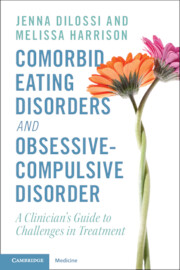 Comorbid Eating Disorders and Obsessive-Compulsive Disorder
Comorbid Eating Disorders and Obsessive-Compulsive Disorder Book contents
- Comorbid Eating Disorders and Obsessive-Compulsive Disorder
- Comorbid Eating Disorders and Obsessive-Compulsive Disorder
- Copyright page
- Contents
- Foreword
- Preface
- Acknowledgments
- Abbreviations
- Part I Overview of the Existing Literature
- Part II Clinical Pitfalls and Treatment Failures
- Part III Evidence-Informed Considerations for Assessment and Treatment
- Part IV Special Topics and Future Considerations
- Chapter 20 Special Topics and Challenges in Treatment
- Chapter 21 Continued Research
- References
- Index
Chapter 20 - Special Topics and Challenges in Treatment
from Part IV - Special Topics and Future Considerations
Published online by Cambridge University Press: 14 December 2023
- Comorbid Eating Disorders and Obsessive-Compulsive Disorder
- Comorbid Eating Disorders and Obsessive-Compulsive Disorder
- Copyright page
- Contents
- Foreword
- Preface
- Acknowledgments
- Abbreviations
- Part I Overview of the Existing Literature
- Part II Clinical Pitfalls and Treatment Failures
- Part III Evidence-Informed Considerations for Assessment and Treatment
- Part IV Special Topics and Future Considerations
- Chapter 20 Special Topics and Challenges in Treatment
- Chapter 21 Continued Research
- References
- Index
Summary
The co-occurrence of EDs and OCD presents specific treatment challenges. The severity of illness is an important factor to consider when treating this presentation as it can impact treatment planning and prognosis. Having this comorbidity decreases the rates of treatment completion for OCD. The degree of insight is also crucial when considering treatment and outcomes. A prior treatment history can also impact compliance and outcome in several ways for both EDs and OCD. Clinicians have no control over any type of messaging or interventions that patients were exposed to by other providers, and bad treatment can be worse than no treatment at all as it leaves more for the new clinician to “undo” to optimize outcomes. Religious and cultural variables should be taken into consideration and managed in the most ethical and culturally sensitive manner. Families and social support are crucial for the treatment process, particularly for adolescent and young adult patients. When these supports are lacking or problematic, it can create additional challenges for the clinician and may require adjustments to the treatment plan as issues arise.
Keywords
- Type
- Chapter
- Information
- Comorbid Eating Disorders and Obsessive-Compulsive DisorderA Clinician's Guide to Challenges in Treatment, pp. 134 - 140Publisher: Cambridge University PressPrint publication year: 2023
